

How we will learn. MindShift explores the future of learning in all its dimensions.

We examine how learning is being impacted by technology, discoveries about how the brain works, poverty and inequities, social and emotional practices, assessments, digital games, design thinking and music, among many other topics. We look at how learning is evolving in the classroom and beyond.We also revisit old ideas that have come full circle in the era of the over scheduled child, such as unschooling, tinkering, playing in the woods, mindfulness, inquiry-based learning and student motivation. We report on shifts in how educators practice their craft as they apply innovative ideas to help students learn, while meeting the rigorous demands of their standards and curriculum. MindShift has a unique audience of educators, tinkerers, policy makers and life-long learners who engage in meaningful dialogue with one another on our sites. Contact the us by email.
Clearing the Mind: How the Brain Cuts the Clutter. Newly discovered neurons in the front of the brain act as the bouncers at the doors of the senses, letting in only the most important of the trillions of signals our bodies receive.

Problems with these neurons could be the source of some symptoms of diseases like attention deficit disorder and schizophrenia. "The brain doesn't have enough capacity to process all the information that is coming into your senses," said study researcher Julio Martinez-Trujillo, of McGill University in Montreal. "We found that there are some cells, some neurons in the prefrontal cortex, which have the ability to suppress the information that you aren't interested in. The Power of Stupidity. j03Evz2wQcrGD.jpg (JPEG Image, 780x512 pixels)
Introduction to Mind and Consciousness. How to train your mind to remember anything. Josha Foer observed the 2005 USA Memory Championship and won it in 2006He says you can teach yourself to remember a lot of information effectively One of the keys is to associate a word or a fact with other things you remember, Foer saysFoer: "If you want to make something memorable, you first have to make it meaningful" Editor's note: Joshua Foer is a writer and the author of "Moonwalking With Einstein: The Art and Science of Remembering Everything.
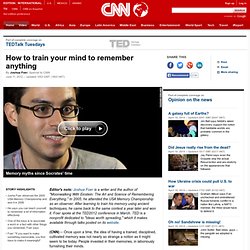
" Artist Manipulates Water With The Power Of Her Mind. "Man is something that shall be overcome.

What have you done to overcome him?” Asked existentialist philosopher Friedrich Nietzsche. NY-based artist Lisa Park took this prompt as an invitation to extend the potential of man beyond our bodily limitations in the performative art project Eunoia, which means “beautiful thought” in Greek. Exploring questions of vulnerability, self-control, and liberation, Park recreates a scene that looks as if it's been lifted from your favorite Kung-Fu movie or an outtake from Kill Bill. Mind-Controlled Musical Instrument Helps Paralysis Patients Rehabilitate.
Music Through the Mind Eduardo Miranda Paralysis patients could play music with their minds , using a new brain-control interface that senses brain impulses and translates them into musical notes. Users must teach themselves how to associate brain signals with specific tasks, causing neuronal activity that the brain scanners can pick up. Then they can make music. It’s a pretty unique use of brain-computer interfaces, which are already being used to do things like drive cars , control robots and play video games. The device was developed by Eduardo Miranda , a composer and computer-music specialist at the University of Plymouth, UK. Introduction to Mind and Consciousness. 10 Amazing Examples of Mind Over Matter. Humans While we often think of our bodies and minds as two distinct entities, it turns out they are much more entwined than we might assume.

Researchers are continually finding evidence that the brain has a distinct power to manipulate the body’s physiology. As these 10 examples show, the mind/body connection can work in our favor or detriment, depending on our knowledge of a situation and our ability to control our thoughts. Judging by their ability to meditate for hours on end, to abstain from food for days, and their vows of silence, most us would agree that Tibetan Monks have better control over their minds and bodies than the average person. Still, what’s particularly amazing is some of them can control physiological processes, such as blood pressure and body temperature – feats many medical doctors find astounding. Where is The Mind?: Science gets puzzled and almost admits a non-local mentalscape. This will be the last "home-produced" blog entry for a while [save the short "Everyday Spirituality" which will follow it as a sign-off] .
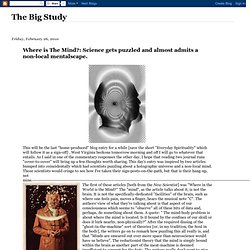
How The Mind Really Works: 10 Counterintuitive Psychology Studies. Net Art - Dr. Hugo Heyrman ( ( (Motions of the Mind) ) ) Is Your Mind Separate From Your Body? Premise #1: “The mind is in the body.” I teach a lot of courses and workshops on mind-body science, and Premise #1 is how I start all of them. It's a basic assumption of modern psychology, especially for those who study the brain .
I define mind as the experience a person has of him or herself—thoughts, emotions, memories , desires, beliefs, sensations, even consciousness itself. And I believe that science can best locate these experiences in the body. Not just in the brain, where we first look for the biological basis of the mind, but distributed throughout the body. For example, hormones circulating throughout the body shape our thoughts and emotions, from testosterone making us more competitive and self-focused to adrenaline making us anxious or energized. Integrating the 16 Habits of Mind. In outcomes-based learning environments, we generally see three elements in play: 1) learning objectives or targets are created from given standards; 2) instruction of some kind is given; and then 3) learning results are assessed.
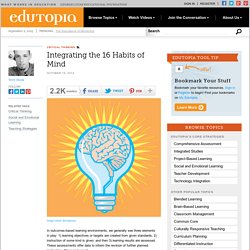
Neuroscience of Free Will. Neuroscience of free will is the part of neurophilosophy that studies the interconnections between free will and neuroscience.
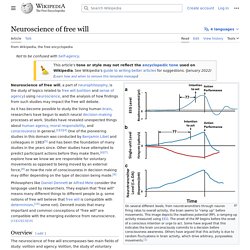
As it has become possible to study the living brain, researchers have begun to watch decision making processes at work. Findings could carry implications for our sense of agency and for moral responsibility and the role of consciousness in general.[1][2][3] Relevant findings include the pioneering study by Benjamin Libet and its subsequent redesigns; these studies were able to detect activity related to a decision to move, and the activity appears to begin briefly before people become conscious of it.[4] Other studies try to predict activity before overt action occurs.[5] Taken together, these various findings show that at least some actions - like moving a finger - are initiated unconsciously at first, and enter consciousness afterward.[6] A monk meditates.
Overview[edit] Mind Modifications. What is a Ganzfeld effect?
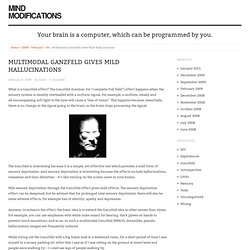
The Ganzfeld (German for “complete/full field”) effect happens when the sensory system is steadily overloaded with a uniform signal. Illusion of Truth. Share share share share Repetition is used everywhere—advertising, politics and the media—but does it really persuade us?

Psychology studies reveal all… Are You Really Open-Minded? Bright Minds and Dark Attitudes. Understanding Human Behavior (English) Fixed Mindset vs. Growth Mindset: Which One Are You? Here is an excerpt from an article about Carol Dweck, a professor of psychology at Stanford University: Through more than three decades of systematic research, [Carol Dweck] has been figuring out answers to why some people achieve their potential while equally talented others don’t—why some become Muhammad Ali and others Mike Tyson. The key, she found, isn’t ability; it’s whether you look at ability as something inherent that needs to be demonstrated or as something that can be developed. To anyone who is into personal growth and self-improvement, this seems obvious. 5 Insane Ways Words Can Control Your Mind. On some level we already know that language shapes the way we think. We're automatically more afraid to fight a guy named Jack Savage than somebody named Peewee Nipplepuss, even if we've never seen either of them before.
It's totally illogical, but you probably run into an example of that every day, and don't notice it. While we tend to think words are just sounds we make to express ideas, science is finding that language is more like a fun house mirror, warping what we see in mind-blowing ways. For instance ... Speaking English Makes Us More Likely to Blame People. The Battle for Your Mind: Brainwashing Techniques Being Used On The Public By Dick Sutphen. Authoritarian followers Mind Control Subliminals. 10 Mind-Blowing Theories That Will Change Your Perception of the World. Gut Reactions: A Perceptual Theory of Emotion (Philosophy of Mind): Jesse J. Prinz: 9780195309362: Amazon.com. 50 Questions That Will Free Your Mind. 10 Ways Our Minds Warp Time.
How time perception is warped by life-threatening situations, eye movements, tiredness, hypnosis, age, the emotions and more… The Distracted Mind. What Are The Habits Of Mind? The Secret to Raising Smart Kids. The Urge to Make Other People Wrong. Mind-reading scan identifies simple thoughts - health - 26 May 2011. 15 Years of Cutting-Edge Thinking on Understanding the Mind. Beautiful Minds: The Psychology of the Savant. Transform Your Mind, Change Your Brain. What Is CogniFit? - Mind Training Program. The Unobservable Mind. How to Develop a Sound Mind. A sound mind in a sound body, is a short, but full description of a happy state in this World: he that has these two, has little more to wish for; and he that wants either of them, will be little the better for anything else. – John Locke.
The Power Of The Mind: How To Train Yourself To Be More Successful : Managing. How can you use the latest discoveries in brain science to improve your life? 40 Photo-Illustrated Questions to Refocus Your Mind.